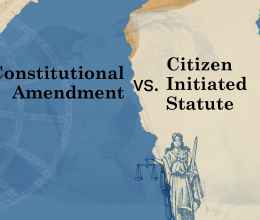Often, when we as a society talk about reforming our criminal justice system, it’s about finding jobs for individuals released from prison or diverting them to treatment in the first place. Rarely do we focus on the conditions of incarceration and its impact on people once they're released.
The national conversation needs to change. When a state removes people from society and imprisons them, it comes with a responsibility to treat people humanely, including staff who work under these same conditions.
Much of my time at the ACLU of Ohio is spent on reforming prison conditions, in particular ending the state’s use of solitary confinement. I recently had the privilege of interviewing a corrections officer.
I listened to stories ranging from why people don’t wear wedding rings to work (can’t have threats against family) to irritation that in hot summer months prisoners get to wear t-shirts and officers have to stay in winter-like uniforms.
“There is no sanctuary for an officer," he said. "COs are exposed to the exact same conditions as prisoners, except they get to leave when their shift ends.”
What struck me right away was how much language matters, and how the state uses it to downplay the realities of prison life. When you say restrictive housing, it sounds like a few privileges are taken away, like you have to be home by 8 p.m. However, in reality, restrictive housing is what the Ohio Department of Rehabilitation and Correction calls long-term solitary confinement. This means 23-hours a day, alone inside a cell.
Prolonged exposure to prison conditions, especially solitary confinement, can cause or exacerbate mental illness in both prisoners and staff.
Solitary confinement is a horrible violation of a person’s dignity and people come out worse for the wear. When prison staff call solitary “segregation” or individual cages “programming booths,” I believe we do a disservice to what people in prison experience.
The officer said, “You can usually see effects among officers at around five years, when the job seeps into your personal and home life.”
He talked about how he and other corrections officers experience a heightened sense of caution, always looking out for potential trouble. He then shared how difficult this is to turn off, especially after many years, even admitting that many officers seek mental health treatment. Prolonged exposure to prison conditions, especially solitary confinement, can cause or exacerbate mental illness in both prisoners and staff.
People working in prisons are just that, people. They are charged with an almost impossible task where society has failed—to be teachers, controllers, and mental health professionals.
“Prisons ask a whole lot more than they should of corrections officers," he said.








